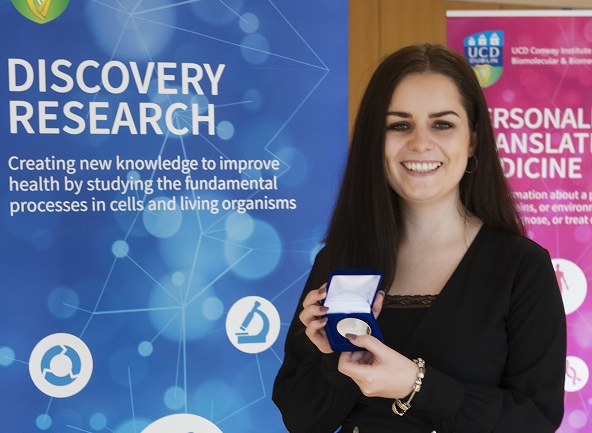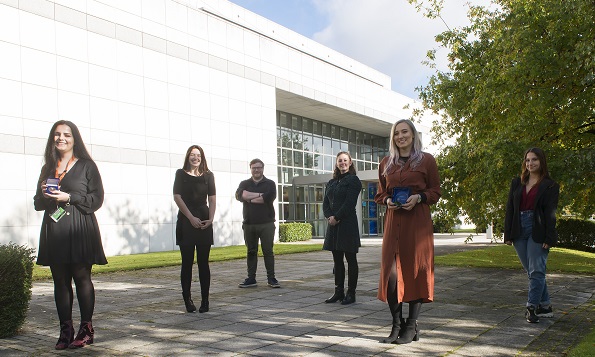2020 UCD Conway Festival gold medal for PhD student, Rebecca Ward
Rebecca Ward has won the 2020 UCD Conway Festival gold medal for research showing how our eyes recycle vitamin A to allow us to see throughout the day.
Rebecca is a Ph.D. researcher funded through an Irish Research Council Enterprise Scholarship with the charity, Fighting Blindness and part of a research team led by Professor Breandan Kennedy in UCD School of Biomolecular & Biomedical Science and UCD Conway Institute.

To see the outside world, the type of vitamin A that we eat in our diet switches from an inactive (light-insensitive) to an active (light-sensitive) form in our eyes. If this switching is not tightly controlled, it can lead to inherited or age-related forms of blindness. The problem Rebecca investigated was to understand how the retina can sustain vision and continue to make the light-sensitive form of vitamin A during daylight conditions.
The retina is the light-sensitive layer in the back of the eye responsible for collecting light and delivering it to the brain so we can see the surrounding environment. It contains specialised cells for receiving light called rod and cone photoreceptors.
Rods are important for vision in dim light but cones function in bright light conditions. As we are active during daylight hours and under artificial lighting at night, most human visual experiences are reliant on these cone cells.
Rebecca investigated vitamin A recycling and daylight vision by cone photoreceptors, using a drug called Emixustat. Emixustat is currently in phase 3 clinical trial for Stargardt disease, a juvenile form of inherited vision loss.
Emixustat was used to block the activity of a protein called RPE65 in small tropical fish, called zebrafish (Danio rerio) whose eyes are very similar to humans. Within the retina, RPE65 has an important job in switching inactive dietary vitamin A to active light sensitive vitamin A.
“Our study found that zebrafish administered with the drug, Emixustat had poorer vision immediately after being removed from night-time darkness. They also had less light-sensitive vitamin A. This means that when we are in darkness, RPE65 protein is important to make the light-sensitive vitamin A so our eyes can see when moving to a well-lit environment”, explained Rebecca.
Changes in the gene that makes RPE65 protein are linked to rapidly progressing forms of inherited childhood blindness. In these conditions, the death of rod and/or cone cells can occur due to inadequate levels of light-sensitive vitamin A. The work also showed that a chemically synthesised form of vitamin A (9-cis-retinaldehye) could restore vision in the zebrafish by bypassing the blockade of RPE65.
Surprisingly, Rebecca discovered that if the zebrafish with impaired vision due to Emixustat treatment, were exposed to light for 30 minutes or longer, they regained full vision. This indicates that RPE65 is required at night to provide light-sensitive vitamin A for vision in the morning. But, during the day, RPE65 is not required, and the eye uses light to regenerate the light-sensitive vitamin A – a clever, efficient solution.
Commenting on Rebecca’s win, Professor Breandan Kennedy said, “I’m delighted Rebecca was awarded the Conway gold medal for research. All of the finalists were outstanding and displayed the breadth of research undertaken at the Conway Institute. Rebecca is an exceptional PhD student with all the qualities to be a future female Irish leader in research. This caps off an extraordinary year for her as she also won the Fighting Blindness Young Female Researcher Bursary 2020, a UCD College of Science Student Recognition Award 2020 and a recognition medal from Enfer Lab for conducting COVID-19 testing in 2020.”
Rebecca was awarded the gold medal sponsored by Cruinn Diagnostics at the closing ceremony of the 2020 UCD Conway Festival of Research & Innovation, which took place online.
Professor William Gallagher, Director, UCD Conway Institute congratulated Rebecca and 85 other early career researchers from across UCD Conway Institute who presented their research during the two-day event.
“Rebecca did an excellent job of conveying her research and findings. It is only by understanding vision at a molecular level that the scientific community will be able to identify new therapeutic avenues to positively impact on the lives of patients”, according to Professor Gallagher.
Rebecca competed against four other early career researchers who were category winners in the moderated research presentations sponsored by Bio-Sciences. They are Dr Shane Comer, UCD Conway SPHERE and Sophie O’Reilly, PhD student with Dr Virginie Gautier (Personalised & Translational Medicine category); Flavia Genua, PhD student with Dr David Hughes (Discovery Research category) and Aoife McNamara, PhD student with Professor Lorraine Brennan (One Health category).
 Pictured (l-r): Rebecca Ward, 2020 UCD Conway Festival gold medal winner; Sophie O’Reilly, Dr Shane Comer, Aoife McNamara and Dr Paulina Szklanna, 2020 UCD Allergan Innovation awardee; Flavia Genua.
Pictured (l-r): Rebecca Ward, 2020 UCD Conway Festival gold medal winner; Sophie O’Reilly, Dr Shane Comer, Aoife McNamara and Dr Paulina Szklanna, 2020 UCD Allergan Innovation awardee; Flavia Genua.
The judging panel for the 2020 UCD Conway Festival gold medal was chaired by Dr David Gomez, Ad Astra Fellow in UCD School of Medicine and Systems Biology Ireland. The panel included Conway Fellows, Professor Fionnuala McAuliffe, UCD School of Medicine and the National Maternity Hospital; Assistant Professor Niamh O’Sullivan, UCD School of Biomolecular & Biomedical Science; Assistant Professor Antonio Benedetto, UCD School of Physics; and Dr Arman Rahman, Translational Research & Engagement Manager, Precision Oncology Ireland.
The annual event also featured keynote lectures from Professor Seamus O'Mahony, Centre for the Humanities and Health, King’s College London; Professor Matthias Mann, Max-Planck Institute of Biochemistry & Novo Nordisk Foundation Center for Protein Research; and Professor Deborah Hogan, Dartmouth Geisel School of Medicine, USA.
Social Media Links